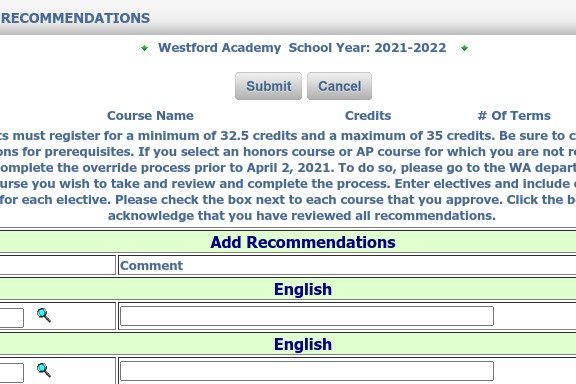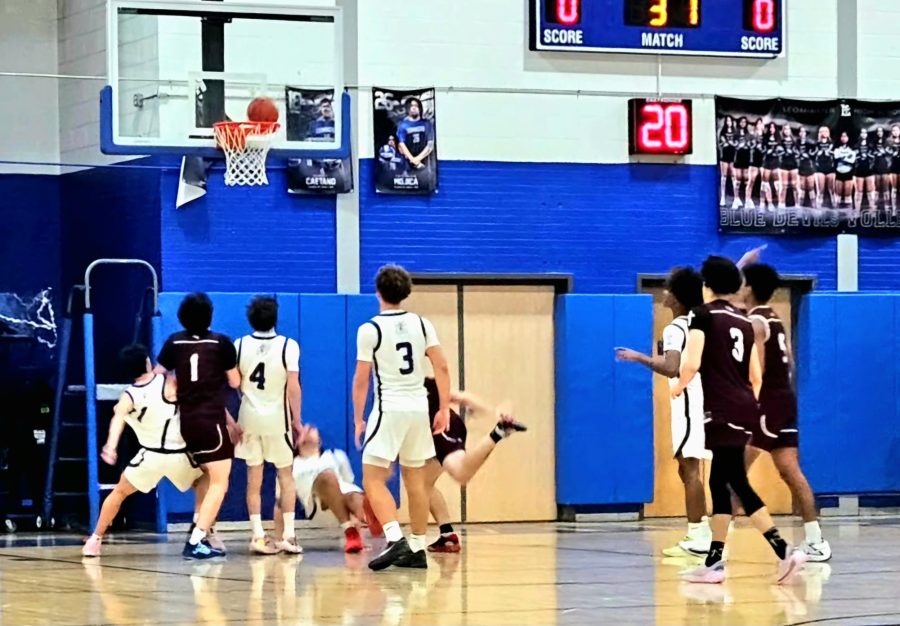March brings later course recommendations for 2021-2022 school year

What the iStudent portal looks like before course recommendations are added.
March 4, 2021
Course recommendations for the 2020-2021 school year are later than previous years. The portal to see recommendations opens on March 23, class choices must be made by April 2, and override forms are also due on April 2. Even though course recommendations are later in the year, schedules for the 2021-2022 school year are expected to be in student’s hands before the end of this school year.
The course recommendations open and close much later this year than the previous years. Pechacek felt that this decision was necessary based on the later start to the school year.
“I really felt like it was the […] most respectful thing to do for teachers, parents, […] and students. To try to rush those decisions in February when we got started so late [is unfair to the teachers], and assessments too, teachers were trying to figure that out,” 6-12 coordinator Wendy Pechacek said.
Students can make their recommendations in iStudent, but parents/guardians in iParent cannot make any changes to the students’ choices.
“The portal is going to open on March 23 at the end of the day, with teacher recommendations and that’ll open for students and parents, but parents are set to view only so students have to make the changes, […] the requests, add the electives and everything [else] on their side,” Pechacek said.
Pechacek tried to also consider eighth-grade families as well when selecting the deadline for course selection.
“The 23rd coincides with […] pretty much the end of their second trimester. […] I was trying to get as close to grades being due for the second trimester [at] the middle school[s], to give those teachers that much more information for those students [to make better recommendations],” Pechacek said.
Even though the course recommendations are late, it gives more time to teachers to observe students so that the teachers can give better recommendations.
Pechacek also said the later course recommendations allow students to have more time to show what kind of student they are to the teachers. This gives students more time to settle in when the beginning of the school year was bumpy.
The later course recommendations also take into consideration the unique situation that the school is in this year. The course recommendations will be based on more subjective information since there is more time for teachers to connect with students.
“[The teachers] are going to continue to focus on the grade that’s published in the Program of Studies. […] There may be some situations where a teacher will say [they] might have some reservations because although [the student] has the grade that the department has indicated necessary for [an honors recommendation], [the teacher] has not seen what [their] department has outlined as the characteristics of an honors student this year,” Pechacek said.
Some changes about the course recommendations this year is that no new courses will be offered next year, and they will not be added to the Program of Studies. Another change is that the override forms will be electronic this year, instead of the traditional paper forms to avoid spreading germs and to follow COVID restrictions.
This change in the override forms will most likely be something that is continued in the future because it is easier to manage and keep track of. Parent/guardian(s) can sign online directly on the form, instead of a paper copy.
However, this year, there is no gap in between the deadline for the recommendations and overrides.
“I decided to move everything to happen later in the year, and because it’s so late, we are not giving time in between the deadline for the recommendations and the deadline for the overrides because things aren’t going to change all that much,” Pechacek said.
Even though overriding into a class is available to all students, it is not recommended. To override into a class, the mid-year average of that class cannot be more than five points below the required prerequisite grade. Students are allowed two overrides per school year.
“We did research and based the parameters [of overriding], meaning no [less] than five and no more than two points from the department guidelines. Those parameters are based on research that we did over three years to see […] what are the tipping points when students really struggle […] to the point where it is affecting every one of their classes, [and they] maybe need additional emotional support outside of school,” Pechacek said.
Although WA is in the hybrid model, Pechacek still expects to hand out schedules for next year before summer vacation. In previous years the schedules have been released close to the senior’s graduation, but since the course recommendations are later this year, the schedules are expected to come out at the end of the school year.
Pechacek wants to remind students that they should focus on subjects they are passionate about, and since the subject is fun for students, they will be more willing to be challenged.
“You want to take those challenges on in the areas where you know that you really love it […] Don’t necessarily do it across the board just because you think you have to. […] Your whole life is going to feel better if you give yourself permission to make those decisions,” Pechacek said.








Mrs. Pechacek • Mar 6, 2021 at 9:55 am
I want to clarify the guidelines for overrides to avoid confusion as students make their decisions.:
1) Students are limited to two overrides.
2) Student mid year average cannot be more than 5 points below the required prerequisite course grade.
Shreya Voruganti • Mar 6, 2021 at 10:48 am
Hi Mrs. Pechacek, thank you for clarifying these guidelines! I have also added that information into my article to make sure the guidelines are clear.